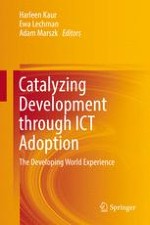2017 | OriginalPaper | Buchkapitel
4. The Role of ICT Adoption in Curbing Corruption in Developing Countries
verfasst von : Mohamed Sami Ben Ali, Seifallah Sassi
Erschienen in: Catalyzing Development through ICT Adoption
Aktivieren Sie unsere intelligente Suche, um passende Fachinhalte oder Patente zu finden.
Wählen Sie Textabschnitte aus um mit Künstlicher Intelligenz passenden Patente zu finden. powered by
Markieren Sie Textabschnitte, um KI-gestützt weitere passende Inhalte zu finden. powered by
